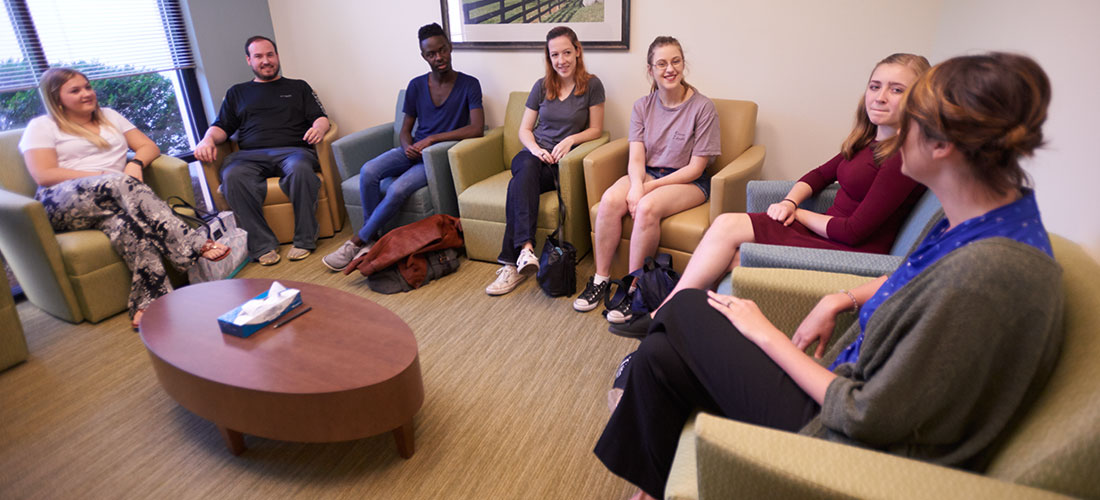Mental Health Disorders and Symptoms
Every client completes a comprehensive diagnostic assessment at admission. The assessment gives our clinical team a clearer picture of the client's diagnoses and clinical needs, as well as an awareness of client's history and background. We then use the results of the assessment to match our clients with an evidence-based treatment plan and a specialized team of professionals.

Adult Programs
Adolescent Programs
Adult clients in our residential treatment for depression and day treatment for depression programs benefit from a powerful mix of evidence-based treatment strategies, including medication, psychotherapy, exercise, and sleep regulation. When medication therapy for depression does not improve symptoms, our treatment team may recommend transcranial magnetic stimulation (TMS), which is offered at Skyland Trail. Most adult clients with depression participate in our cognitive behavioral therapy (CBT) recovery community. Specialized treatment is available for adults with depression and anxiety, depression and psychosis, depression and substance use, depression and PTSD, or depression and borderline personality disorder.
Medications are essential and effective in controlling bipolar disorder, including bipolar I, bipolar II, rapid cycling, or cyclothymia. As our clients' active symptoms are resolved through medication and psychotherapy, they can focus on developing the skills they need to manage mood episodes and prevent crises. In addition to applying specialized evidence-based therapies like cognitive behavioral therapy (CBT) and dialectical behavior therapy (DBT), we provide support to help clients address their symptoms through proven strategies like routinely getting eight hours of sleep each night, engaging in cardiovascular exercise, improving nutrition, and participating in positive leisure and social activities.
Our first priority is to identify a medication strategy to control hallucinations and delusions. But medication is only the first step. We then help clients develop skills they need to manage their illness and feel safe and healthy in the world. As part of our residential treatment program for schizophrenia, clients receive support to manage their own hygiene and nutrition. A significant focus of individual and group therapy sessions is social integration, relationship building and emotional coping skills. Clients experiencing their first episode of psychosis likely will be part of our cognition and first episode specialized recovery community, while older adults seeking to manage ongoing symptoms will likely join our social integration recovery community. All clients with psychosis participate in computer-based cognitive remediation training, and additional dual diagnosis programs are available for clients with schizophrenia and substance use.
Our residential treatment program for anxiety and our day treatment program for anxiety in Atlanta help clients adopt new strategies to cope with stress. Through personalized psychotherapy and cognitive behavioral therapy (CBT) groups, clients gradually learn to reframe their thoughts and adjust behaviors to prevent the disabling responses to stress that were causing them pain and disability. As part of a structured daily structure, clients with anxiety primarily participate in groups focused on CBT skills and also benefit from DBT groups focused on mindfulness and distress tolerance.
Adults with borderline personality disorder (BPD) likely will be assigned to our dialectical behavior therapy (DBT) program. Our DBT clients have symptoms that include impulsivity, self-injurious behaviors or frequent suicide attempts. Client who admit to our residential DBT program have not developed healthy coping skills for handling stress or emotional discomfort. Medications are generally ineffective for treating borderline personality disorder. DBT has been proven an effective therapeutic approach for helping individuals who struggle with BPD or emotional dysregulation manage their symptoms, feel validated and accepted, improve relationships, and live a life worth living.
The dual diagnosis program at Skyland Trail is designed to treat clients with a primary mood, thought, or anxiety disorder who have a co-occurring substance misuse issue. Research shows that treating both problems at the same time leads to the best results. Skyland Trail is not appropriate for individuals with a primary substance use disorder and is not a detoxification facility. Dual Diagnosis clients meet in an additional daily group focused on understanding the addictive process, managing cravings, utilizing community supports and preventing relapse. Individual work with a primary counselor and a psychiatrist addresses both psychiatric and substance use challenges. Our experts give our clients the best chance for recovery through effective medications, therapy and connections to 12-step recovery programs. Recovery is not just about "giving things up." It is also about constructing a life that supports health and happiness in a sustainable way.
The model of care practiced at the Skyland Trail adult and adolescent treatment programs is “trauma-informed.” By helping trauma survivors first address symptoms of depression, anxiety, or borderline personality disorder, trauma-informed psychiatric treatment allows patients to develop insight and adopt healthy coping skills to handle difficult emotions before beginning the challenging work of processing their specific trauma.
Individuals who cut themselves or engage in other self-injurious behaviors often are using this unhealthy coping strategy to deal with emotional pain or confusion that they do not know how to process in any other way. Self harm behaviors can be successfully treated with evidence-based therapy.
Residential treatment may be the right level of care for someone with frequent suicide attempts or who struggles with thoughts of suicide.
Holistic Path to Wellness
At Skyland Trail, we build a treatment plan around a person, not a diagnosis. The impact of living with a mental illness goes far beyond a set of clinical symptoms. We treat the whole person in addition to the brain.
As a unique mental health community, we provide a safe and nurturing place to recover. Through our holistic and integrated program, clients are given the opportunity to:
- solidify an effective medication strategy
- learn coping mechanisms
- practice independent living skills
- set goals for work and relationships
- develop outlets for creative expression
- explore their spirituality, and
- improve physical fitness and nutrition
While each of our clients determines his or her own recovery goals, our overarching goal for all clients is that they leave Skyland Trail better equipped to live in the world.
